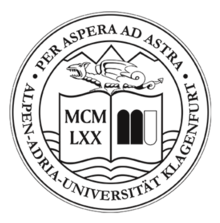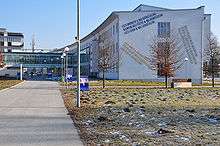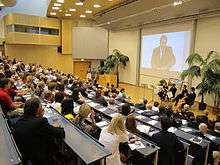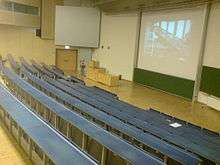Alpen-Adria-Universität Klagenfurt
| Alpen-Adria-Universität Klagenfurt | |
 | |
| Motto | Per Aspera Ad Astra (Latin) |
|---|---|
Motto in English | Through hardships to the stars |
| Type |
Flagship Public |
| Established | 1970 / 1975 / 1993 |
| Budget | € 55 million (annual federal funding) |
| President | Oliver Vitouch |
Academic staff | 540 |
| Students | 10,600[1] |
| 1,170[2] | |
| Location | Klagenfurt, Austria |
| Campus | Suburban, 27 acres (11 ha) |
| Colors | Shades of Blue |
| Website | www.uni-klu.ac.at/ |
| Data as of 2013 | |
The University of Klagenfurt (also Alpen-Adria-Universität Klagenfurt, AAU) is a federal Austrian University and the largest research and higher education institution in the Austrian province of Carinthia. It has its main campus in Klagenfurt, with additional facilities in Austria's two largest cities Vienna and Graz.
Efforts to found the University began in 1964, and succeeded in 1970, during the term of Governor Sima. Today, the University holds faculties of Humanities & Social Sciences, Management & Economics, Technology, and Interdisciplinary Studies.
The School of Interdisciplinary Studies (IFF) also runs departments in Vienna and Graz; the former Dean of IFF, Verena Winiwarter, was elected Austrian "Scientist of the Year" 2013. In addition to the departments and units of the four faculties, the University also hosts a number of central facilities such as the Robert Musil Institute (co-organizer of the Bachmann Prize), the University Cultural Center (UNIKUM), the build! Gründerzentrum (a start-up facilitation center), the University Sports Center (USI), and the Klagenfurt University Library.
The incumbent President of the University is Oliver Vitouch, a cognitive psychologist and former faculty member of the University of Vienna and the Max Planck Institute for Human Development in Berlin. Norbert Frei chairs the Academic Senate, Robert Rebhahn the Board of Trustees.
Klagenfurt is the southernmost university in the German-speaking countries (followed by the University of Bern, Switzerland) and supports bi- and multilingualism, especially in the context of the Slovenian minority in Carinthia (the Carinthian Slovenes).
History




The Kärntner Universitätsbund, an association established to promote the development of the university and still in existence today, was founded in 1964.
In 1970 the Austrian parliament passed a federal law allowing the establishment of the Institute for Educational Science in Klagenfurt. The first doctoral degree was conferred in 1972. During the period from 1973 to 1978 the diploma, teaching certificate and doctoral degree programmes were established. Regular degree programmes commenced in 1973. In 1975 new laws on the organisation of higher education came into force, and the name of the institute was changed to Universität für Bildungswissenschaften (University for Educational Sciences).
The inter-university research institute for teaching technology, media skills and the teaching of engineering was founded in 1978; it was closed down ten years later. In 1979 an inter-university research institute for distance studies was established, which was renamed inter-university institute for interdisciplinary research and continuing education in 1991 – and bears the German abbreviation IFF.
The fields of study „Applied Business Administration“ and „Applied Informatics“ were established and expanded from 1983 onwards. In 1993, the university’s name was changed to Universität Klagenfurt, and at the same time, a Faculty of Humanities and a Faculty of Economics, Business Administration and Informatics were inaugurated.
The Faculty of Interdisciplinary Studies (IFF) was inaugurated as third faculty on January 1, 2004. It succeeded the inter-university institute for interdisciplinary research and continuing education at the universities of Klagenfurt, Vienna, Graz and Innsbruck (IFF). The university adopted the official name Alpen-Adria-Universität Klagenfurt on October 1, 2004.
A fourth, technical sciences faculty was added to the university on January 1, 2007 (with a focus on the key areas of Applied Informatics and Ambient Intelligence), engaging in research operations in collaboration with the Lakeside Science & Technology Park. In the winter semester of 2007/08, the number of students exceeded 8,000 for the first time, and went on to pass the 10,000 mark just a few years later.
Campus
With its suburban setting, the university campus is in walking distance of both the renaissance-dominated historic city center of Klagenfurt (capital of the state of Carinthia) and the east bay of the Wörthersee, a renowned Austrian summer resort. Also hiking, climbing and skiing possibilities in the Austrian Alps are nearby. Together with the adjacent Lakeside Science & Technology Park,[3] a 60 acres start-up and spin-off park, the university campus forms the so-called Lakeside District.
Degree programs
Diploma programs, Bachelor's degree & Master's degree programs[4]
- Adult and Vocational Education (Master)
- Applied Business Administration (Bachelor/Master)
- Applied Cultural Sciences (Bachelor/Master)
- Business and Law (Bachelor/Master)
- Educational Science (Bachelor)
- English and American Studies (Bachelor/Master)
- Geography (Bachelor/Master)
- German Studies (Bachelor/Master)
- History (Bachelor/Master)
- Informatics (Bachelor/Master/PhD)
- Information Management (Bachelor/Master)
- Information Technology (Bachelor/Master/PhD)
- International Management (Master)
- Media & Communications Science (Bachelor)
- Media and Convergence Management (Master)
- Media, Communication and Culture (Master)
- Philosophy (Bachelor/Master)
- Psychology (Bachelor of Science/Master of Arts/Master of Science/PhD)
- Romance Studies (Bachelor/Master)
- School Education (Master)
- Slavic Studies (Bachelor/Master)
- Social and Human Ecology (Master)
- Social and Integrative Teaching (Master)
- Technical Mathematics (Bachelor/Master/PhD)
Teacher training programmes
- English
- French
- Geography and Economics
- German
- History, Social Studies and Political Education
- Informatics and Informatics Management
- Italian
- Mathematics
- Slovenian
Doctoral degree programs
- Doctoral degree program in Natural Sciences
- Doctoral degree program in Philosophy
- Doctoral degree program in Social and Economic Sciences
- Doctoral degree program in Technology
- International PhD program "Interactive and Cognitive Environments"
Faculties, Departments and University Centers
Faculty of Humanities
The Faculty of Humanities currently encompasses twelve departments and a faculty centre. Their common ambition, beyond doing discipline-specific research, is to foster multilingualism and intercultural education, with particular emphasis on the Alps-Adriatic region.
- Department of English and American Studies
- Department of Culture, Literature and Music
- Department of Educational Sciences and Research
- Department of German Studies
- Department of Didactics of German
- Department of History
- Department of Media and Communications Science
- Department of Philosophy
- Department of Psychology
- Department of Romance Studies
- Department of Slavonic Studies
- Robert Musil Institute for Literary Studies
- Faculty Centre for sign language & Comm. for the hearing impaired
Faculty of Management and Economics
The Faculty of Management and Economics has a focus on applied business management while fostering interdisciplinary links with law, sociology, economics and application-oriented geography. Within these disciplines, the Faculty concentrates on areas of research and development, teaching and consultancy work in fields where cultural, business and social factors interact.[5]
- Department of Business Management
- Department of Economics
- Department of Financial Management
- Department of Innovation Management and Entrepreneurship
- Department of Production/Operations Management, Business Logistics and Environmental Management
- Department of Public, Nonprofit and Health Management
- Department of Sociology
- Department of Geography and Regional Studies
- Department of Law
Faculty of Technical Sciences
The Faculty of Technical Sciences is dedicated to research and training in the fields of informatics, information technology and technical mathematics. The Faculty was founded in January 2007 and superseded the Faculty of Economics, Business Administration and Informatics as well as a newly established Department for information and communication technology. The Faculty is headed by Dean Gerhard Friedrich (informatics) and Vice-Dean Clemens Heuberger (mathematics). It is organized into nine departments and offers four bachelor's degree programs, four master's degree programs, two teacher training degree programs and two doctoral programs.
- Department of Applied Informatics
- Department of Informatics Didactics
- Department of Informatics Systems
- Department of Information Technology
- Department of Mathematics
- Department of Mathematics Education
- Department of Networked and Embedded Systems
- Department of Smart Systems Technologies
- Department of Statistics
The special research area "self-organizing networked systems" closely collaborates with the independent research institute Lakeside Labs.[6]
Faculty of Interdisciplinary Studies
The Faculty of Interdisciplinary Studies develops, tests and evaluates innovative ideas in the academic fields of research, training and organization. The objective of the Faculty is to tackle prevailing social problem areas by creating adequate research and learning processes.
- Department of Instructional and School Development
- Department of Organization Development, Group Dynamics and Intervention Research
- Department of Palliative Care and Organizational Ethics
- Department of Science and Technology Studies, Technology and Society Studies]
- Department of Science Communication and Higher Education Research
- Department of Social Ecology
- Faculty Center for Peace Research and Education
University Centres
- Center for Women's and Gender Studies
- M/O/T – School of Management, Organizational Development and Technology
- School of Education (SoE)
- UNIKUM
Honorary doctors
- Hans Albert (2007)
- Manfred Bockelmann (2013)
- Joseph Buttinger (1977)
- Karl Corino (2014)
- Peter Eichhorn (2003)
- Helmut Engelbrecht (1998)
- Hertha Firnberg (1980)
- Adolf Frisé (1982)
- Gerda Fröhlich (1995)
- Manfred Max Gehring (1992)
- Ernst von Glasersfeld (1997)
- Michael Guttenbrunner (1994)
- Maja Haderlap (2012)
- Peter Handke (2002)
- Adolf Holl (2000)
- Sigmund Kripp (1998)
- Maria Lassnig (1999 / 2013) [7]
- Claudio Magris (1995)
- Ewald Nowotny (2008)
- Valentin Oman (1995)
- Paul Parin (1995)
- Wolfgang Petritsch (2013)
- Theodor Piffl-Perčević (1977)
- Janko Pleterski (2005)
- Wolfgang Puschnig (2004)
- Josef Rattner (2006)
- Siegfried J. Schmidt (2004)
- Klaus Tschira (1995)
- Peter Turrini (2010)
- Oswald Wiener (1995)
- Horst Wildemann (2003)
- Josef Winkler (2009)
References
- ↑ http://www.uni-klu.ac.at/studabt/statistiken/2013_winter_studierende.pdf
- ↑ http://www.uni-klu.ac.at/studabt/statistiken/2013_winter_studierende.pdf
- ↑ http://www.lakeside-scitec.com/en/
- ↑ http://www.uni-klu.ac.at/studabt/inhalt/1992.htm
- ↑ http://www.uni-klu.ac.at/fwiwi_eng/inhalt/1.htm
- ↑ http://www.lakeside-labs.com/
- ↑ Awarded 1999, accepted 2013
External links
- University of Klagenfurt Website
- University Sports Center (USI)
- UNIKUM
- Robert Musil Institute for Literary Studies
- M/O/T – School of Management, Organizational Development and Technology
- build! Gründerzentrum
Coordinates: 46°36′59″N 14°15′54″E / 46.61639°N 14.26500°E